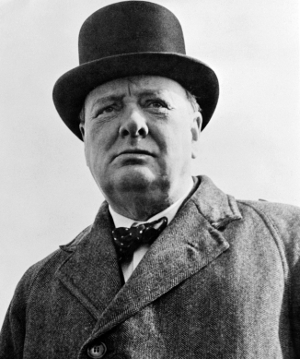The Weekly Round-Up: Beam me up, Siri

And MPs on Twitter ban: We shall fight them on the beaches - and in the House of Commons...
The spirit of Winston Churchill was recently invoked by MPs battling a terrifying threat to their freedom.
Admittedly, it wasn't quite the same kind of implacable foe that was faced down by the cigar-chomping wartime premier. Instead, this threat took the form of a risk that MPs might be banned from tweeting in the Commons.
Wisely, MPs voted against a motion that would have banned tweeting inside the Commons but not before some heated debate.

Winston Churchill, WWII leader and Twitter advocate?Photo: United Nations Information Office, New York
So where does Churchill come into this? MP Kevin Brennan said Twitter's thrifty character limit upheld the tradition of succinct, punchy sloganeering that stretched back to Winston Churchill himself.
Brennan said: "There is nothing new in political communication in trying to get a message across in a pithy, memorable way, as Twitter enables us to do. In fact, I think it was a certain Winston Churchill who said: 'Never in the field of human conflict was so much owed by so many to so few.'
"If that statement was issued as a tweet, it would leave 66 of the 140 characters available on Twitter still to play with. That goes to show that those who want to fight the onslaught of technology on the beaches will find that the tide is turning against them."
You have to wonder what Churchill would have done had Twitter existed during that time of conflict. Perhaps the great Prime Minister would have considered the message complete in itself and left the 66 characters spare for retweets.
Who knows how his measured words would have been met by the Twitterverse, had it existed. Perhaps #GoWinston would have been a trending topic. Or might his pudgy fingers have been moved to include a hashtag to further stir British spirits? Alas, we will never know.
But not every MP was in support of the brave new world of communications technology. Sir Alan Haselhurst said: "I am aware that it will give me a good chance of becoming the leading candidate for the 'dinosaur of the year' award," and added: "If it appears that we are being prompted from outside - which is entirely possible if handheld devices are produced in the House - our reputation will decline."
Damage the reputation of MPs? If only such a thing were possible...
The iPhone: Definitely not brought to you by the number 5
Despite wails of distress from people who wanted an all-new design and iteration number, Apple has gone on to sell more than a few of the iPhone 4S since its launch.
Naysayers completely panned the 4S. It didn't look any different and it didn't even have a new number, just a letter. The writing was on the wall for the iPhone.
Unfortunately, these people completely missed the point. In addition, they were so wholly inaccurate with predictions of doom, that they should consider a career as Wall Street analysts.
Earlier this week Apple announced that despite the utter absence of the number 5 anywhere on the packaging, somehow it has managed to shift four million of the blighters.
One of the possible reasons for its success is...
...Siri, the personal digital assistant that answers spoken questions in a natural language.
The demo of Siri revealed a softly spoken woman's voice answering questions from Apple iPhone chief Scott Forstall.
Curiously, in the UK Siri is male. Presumably because British men make up a large demographic of UK users and are too embarrassed to talk to a woman they haven't been formally introduced to.
Siri - who actually 'lives' in the cloud and not in the phone itself - is clearly a very clever bit of tech.
Siri: a personal digital assistant that actually has a sense of humour?Photo: Apple
As with all new incarnations of artificial intelligence, the initial response from users is not to explore the full capabilities of new technology in search of human betterment, it is to ask it stupid questions to try to catch it out.
Interestingly, Siri has dealt rather well with this as some of the following responses demonstrate.
User: "Beam me up."
Siri: "OK, stand still."
User: "Talk dirty to me."
Siri: "Humus. Compost. Pumice. Silt. Gravel."
User: "You are my best friend."
Siri: "If you insist."
User: "I do."
Siri: "OK."
User: "Am I your best friend?"
Siri: "No comment."
User: "Open the pod bay doors."
Siri: "That's a rather insensitive thing to say to an intelligent agent."
A genuinely useful and well implemented bit of interface design from Apple and a personal digital assistant that actually has a sense of humour?
If only they'd changed the shape of the case a bit, or called it the iPhone 6 Awesome-o, they might have a winner on their hands...
The trouble with hoarding...
The Round-Up is a bit of a hoarder. Sometimes I lay awake at night wondering when the creaking ceiling will finally give up and disgorge my huge stash of yellowing magazines, decomposing VHS tapes and antique mobile handsets that I've squirreled away in the loft over the years, burying me in a mass of Ethernet cables, borked hard drives and under-capacity USB keys like some 21st-century cyberviking funeral.
But maybe that's just me.
And, of course, one day that stuff will either be useful again, or actually worth something.
And it's good to see that CIOs are also hoarders, if on a slightly larger and more expensive scale. According to Gartner, CIOs should place as much value on decommissioning and simplifying projects as they do on creating new ones. Except they don't. Not enough planning effort goes into how to simplify, how to decommission, and how to get rid of stuff that is no longer necessary. Still, they probably don't have to keep it all in the loft.
Quote of the week
"Sitting in a garage designing those first little products, I was inspired by ideas of people talking about a revolution where everybody is going to have a computer in their home and going to become technology geeks like us." Guess who?